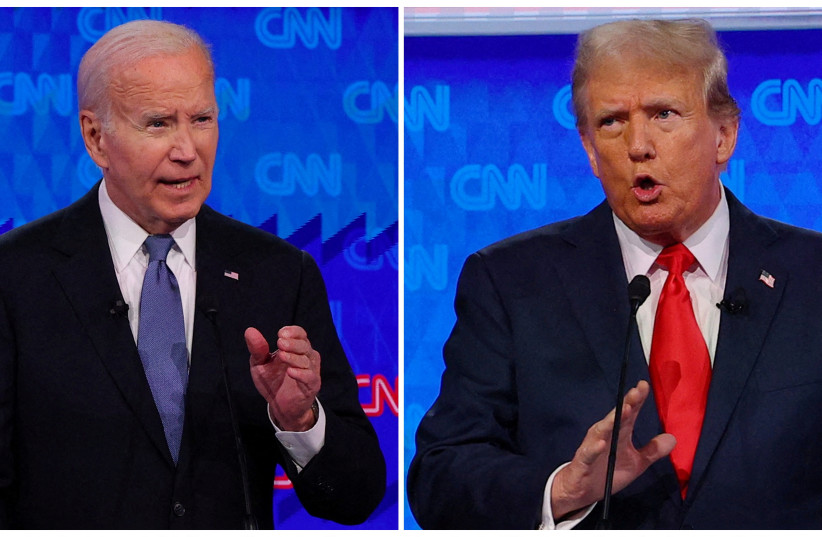Sen. J. D. Vance, named on Monday at the Republican National Convention in Milwaukee as Donald Trump’s running mate for the November 5 presidential election, is an eloquent and strong supporter of Israel. Vance, a Republican senator from Ohio, is also known to be a staunch advocate for a robust US-Israel relationship and an outspoken opponent of antisemitism in America. Whether you support the Republicans or the Democrats or neither, this is good news for Israel and American Jews, who have witnessed an alarming spike in antisemitism since October 7.
In an interview with The Jerusalem Post’s then-diplomatic correspondent Lahav Harkov, Vance clarified during his visit to Israel in July 2022 that a solid US-Israeli relationship is based on shared values. “I will be as strong an advocate for the US-Israeli relationship as anyone,” he pledged, saying he believed, inter alia, that “the Iran deal was a disaster, Israel is our most important ally, and Trump was right to move the [embassy] to Jerusalem.”
“I got it intellectually, but emotionally, I didn’t realize,” Vance said after a tour of Jerusalem that included the Old City and the City of David. “[Jerusalem] is the world’s most important cultural heritage site. If Israel didn’t control this land, I would never understand this experience.”
Asked about antisemitism in the US, Vance insisted that “America remains one of the great places to live if you are Jewish. The question now is how to reverse the negative trend of the last years.” His answer was “to aggressively stamp out and prosecute crimes,” adding: “Antisemitism is a particular kind of crime. You have to enforce the law. If you beat up a Jew and don’t face consequences, the attacks will continue and get worse.”
Being only 39, the vice presidential hopeful offers a youthful counterpoint to the candidates at the top of both tickets. Trump turned 78 on June 14, while US President Joe Biden will be 82 on November 20. Born and raised in Ohio, Vance is a former venture capitalist who gained widespread attention after the release of his bestselling memoir Hillbilly Elegy, which relates how his blue-collar upbringing in the Midwest had shaped his political views.

While he was a harsh critic of Trump in the run-up to the 2016 election, Vance has since become a deft defender of the former president, particularly on television. “Look, I was wrong about Donald Trump. I didn’t think he would be a good president,” Vance told Fox News in an interview last month. “He was a great president, and it’s one of the reasons why I’m working so hard to make sure he gets a second term.”
Focuses of foreign policy
After the assassination attempt against Trump on Saturday, Vance posted on X: “Today is not just some isolated incident. The central premise of the Biden campaign is that President Donald Trump is an authoritarian fascist who must be stopped at all costs. That rhetoric led directly to [former] President Trump’s attempted assassination.”
The Biden campaign rejected the claim, with the president urging all Americans to “lower the temperature” of political rhetoric and work together to stop viewing political opponents as enemies. Vice President Kamala Harris contacted Vance “and left a message congratulating him on his selection, welcoming him to the race and expressing her hope that the two can meet in the vice presidential debate.”
In explaining his choice on his Truth Social platform, Trump praised Vance’s military service (he fought in the US Marine Corps and served in the Iraq War) and Ivy League pedigree (after graduating from Ohio State University, he earned a law degree at Yale). Acknowledging that he values his running mate’s Midwest strength in an election set to be closely fought in swing states, Trump said Vance would “be strongly focused on the people he fought so brilliantly for – the American workers and farmers in Pennsylvania, Michigan, Wisconsin, Ohio, Minnesota and far beyond.”
Trump’s and Vance’s political views are similar, particularly on trade (supporting across-the-board tariffs), immigration (advocating the deportation of millions of undocumented migrants), and foreign policy (Trump’s America First Agenda states that the US should cut foreign aid, including to Ukraine).
In a speech at the Quincy Institute in Washington in May, Vance made a point of distinguishing between US funding for Ukraine and support for Israel. “It’s sort of weird that this town assumes that Israel and Ukraine are the same,” he said. “They’re not, of course, and I think it’s important to analyze them in separate buckets.”
Explaining that “a big part of the reason why Americans care about Israel is that we are still the largest Christian-majority country in the world,” he said, adding that, “The idea that there is ever going to be an American foreign policy that doesn’t care a lot about that slice of the world is preposterous.”
Without taking sides in the US election, we welcome Vance’s nomination, thank him for supporting Israel in its war against terror, and wish him well.
